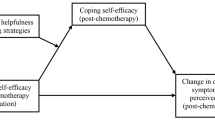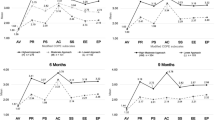Abstract
Relations among coping, physical symptoms, and affect were investigated in 43 women undergoing adjuvant chemotherapy for breast cancer. Patients were assessed at the same point in their treatment so that the time for which coping was reported would be equivalent across individuals. Patients were asked how they coped specifically with chemotherapy, rather than how they coped with cancer in general, to make the domain specific. Positive and negative affect were assessed separately, using a scale free of somatic content. Relations between coping and affect were consistent with prior studies that have employed a general approach to assessing coping. Coping correlates of positive and negative mood differed. When the relations between physical symptoms and affect were examined, physical symptoms were related to negative affect but not to positive affect. Findings are discussed in terms of their implications for coping with cancer as well as their implications for the general coping literature.
Similar content being viewed by others
References
Cohen, F., and Lazarus, R. (1979). Coping with the stresses of illness. In Stone, G. C., Adler, N. E., and Cohen, F., (eds.),Health Psychology, Jossey-Bass, San Francisco, pp. 217–254.
Collins, D., Baum, A., and Singer, J. (1983). Coping with chronic stress at Three Mile Island: Psychological and biochemical evidence.Health Psychol. 2: 149–166.
Craig, T., and Abeloff, M. (1974). Psychiatric symptomatology among hospitalized cancer patients.Psychosom. Med. 131: 1323–1327.
Diener, E., and Emmons, R. (1984). The independence of positive and negative affect.J. Personal. Soc. Psychol. 47: 1105–1117.
Dohrenwend, B. P., Shrout, P. E., Egri, G., and Mendelsohn, F. (1980). Non-specific psychological distress and other dimensions of psychopathology.Arch. Gen. Psychiat. 37: 1229–1236.
Dunkel-Schetter, C., Feinstein, L., Taylor, S., and Falke, R. (1992). Patterns of coping with cancer.Health Psychol. 11: 79–87.
Evans, D., McCartney, C., Nemeroff, C., Raft, D., Quade, F., Gold,en, R., Haggerty, J., Holmes, V., Simon, J., Droba, M., Mason, G. and Fowler, W. (1986). Depression in women treated for gynecological cancer: Clinical and neuroendocrine assessment.Am. J. Psychiat. 143: 447–452.
Felton, B., and Revenson, T. (1984). Coping with chronic illness: A study of illness controllability and the influence of coping strategies on psychological adjustment.J. Consult. Clin. Psychol. 52: 343–353.
Felton, B., Revenson, T., and Hinrichsen, G. (1984). Stress and coping in the explanation of psychological adjustment of chronically ill adults.Soc. Sci. Med. 18: 889–898.
Folkman, S., Lazarus, R., Dunkel-Schetter, C., Delongis, A., and Gruen, R. (1986a). Dynamics of a stressful encounter: Cognitive appraisal, coping and encounter outcomes.J. Personal. Soc. Psychol. 50: 992–1003.
Folkman, S., Lazarus, R., Gruen, R., and DeLongis, A. (1986b). Appraisal, coping, health status and psychological symptoms.J. Personal. Soc. Psychol. 50: 571–579.
Guagagnoli, E., and Mor, V. (1989). Measuring cancer patients' affect: Revision and psychometric properties of the Profile of Mood States (POMS).Psychol. Assess. 1: 150–154.
Holland, J. H., and Rowland, J. (1989).Handbook of Psychooncology, Oxford University Press, New York.
Irvine, D., Brown, B., Crooks, D., Roberts, J., and Browne, G. (1992). Psychosocial adjustment in women with breast cancer.Cancer 67: 1097–1117.
Lansky, S., List, M., Herrmann, E., Ets-Hokin, T., DasGupta, G., Wilbanks, G., and Hendrickson, F. (1985). Absence of major depressive disorder in female cancer patients.J. Clin. Oncol. 3: 1552–1560.
Lazarus, R. (1966).Psychological Stress and the Coping Process, McGraw-Hill, New York.
Lazarus, R., and Folkman, S. (1984). Coping and adaptation. In Gentry, W. D. (ed.),The Handbook of Behavioral Medicine, Guilford, New York, pp 282–325.
McNair, D., Lorr, M., and Droppleman, L. (1971).Manual for the Profile of Mood States, Educational Testing Services, San Diego.
Meyerowitz, B. (1983). Postmastectomy coping strategies and quality of life.Health Psychol. 2: 117–132.
Plumb, M., and Holland, J. (1981). Comparative studies of psychological function in patients with advanced cancer. II. Interviewer-rated current and past psychological symptoms.Psychosom. Med. 43: 243–254.
Sabbioni, M., Bovbjerg, D., Jacobsen, P., Manne, S., and Redd, W. H. (1992). Treatment related psychological distress during adjuvant chemotherapy as a conditioned response.Ann. Oncol. 3: 393–398.
Stone, A., Greenberg, M., Kennedy-Moore, E., and Newman, M. (1991). Self-report, situation-specific coping questionnaires: What are they measuring?J. Personal. Soc. Psychol. 61: 648–658.
Temoshok, L., and Fox, B. (1984). Coping styles and other psychosocial factors related to medical status and to prognosis in patients with cutaneous malignant melanoma. In Fox, B. H., and Newberry, B. H. (eds.),Impact of Psychoendocrine Systems in Cancer and Immunity, Hofgrefe, Lewiston.
Veit, C., and Ware, J. (1983). The structure of psychological distress and well-being in general populations.J. Consult. Clin. Psychol. 51: 730–742.
Watson, D. (1988). Intraindividual and interindividual analyses of positive and negative affect: Their relation to health complaints, perceived stress, and daily activities.J. Personal. Soc. Psychol. 54: 1020–1030.
Watson, D., and Pennebaker, J. (1989). Health complaints, stress, and distress: Exploring the central role of negative affectivity.Psychol. Rev. 96: 234–254.
Watson, D., and Tellegen, A. (1985). Toward a consensual structure of mood.Psychol. Bull. 98: 219–235.
Watson, M., and Greer, S. (1983). Development of a questionnaire measure of emotional control.J. Psychosom. Res. 27: 299–305.
Weinberger, D., Schwartz, G., and Davidson, R. (1974). Low-anxious, high-anxious, and repressive coping styles: Psychometric patterns and behavioral and physiological responses to stress.J. Abnorm. Psychol. 88: 369–380.
Weisman, A., and Worden, J. (1976–1977). The existential plight in cancer: Significance of the first 100 days.Int. J. Psychiat. Med. 7: 1–15.
Zautra, A., and Reich, J. (1983). Life events and perceptions of life quality-Developments in a two-factor approach.J. Commun. Psychol. 11: 121–132.
Author information
Authors and Affiliations
Rights and permissions
About this article
Cite this article
Manne, S.L., Sabbioni, M., Bovbjerg, D.H. et al. Coping with chemotherapy for breast cancer. J Behav Med 17, 41–55 (1994). https://doi.org/10.1007/BF01856881
Accepted:
Issue Date:
DOI: https://doi.org/10.1007/BF01856881




